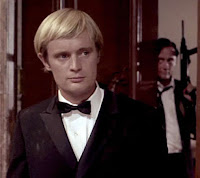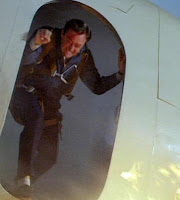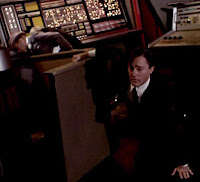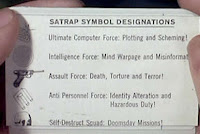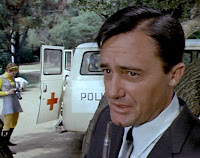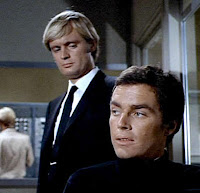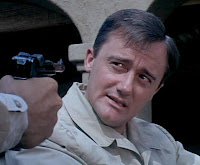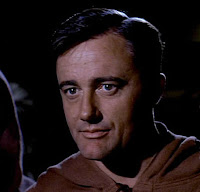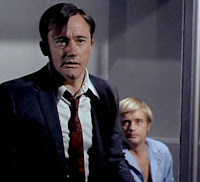
So our favorite TV agents, Solo and Illya, are back. From what I gather, fan opinions on this one are mixed, with “love” and “hate” running neck and neck. (Okay, “hate” surges ahead on the final turn by the clubhouse.) When "The Return of the Man from U.N.C.L.E." first aired in the spring of 1983, I was working nights, and called in sick to watch it, since I had no VCR. For some reason -- probably the fact that Season One was a good 18 years in the past at that point -- I proclaimed that it was much like a first season show, which I wince to recall now that I’ve actually seen those episodes again. But “Fifteen Years” has more than a few points to enjoy.
First we have to get through the initial 45 minutes, in which we meet our villains (good), catch up with Solo (poor) and Illya (fun), get a cameo by a certain Aston Martin-driving
British agent (gack!), and

have our heroes meet again after 15 years (cool!).
What it suffers from most is a lack of . . . well, confidence. Yes, it appears cheap. The “new” U.N.C.L.E. Headquarters consists of a hallway with a new logo, a London club-style office for Sir John with a computer bank in it, and the new Heckler & Koch Special; and that’s about all. Sure, the original series had budget constraints too. Somehow, though, it made us believe in Sam Rolfe’s micro-world, tailor shop, reception room, steely corridors, and all. This production appears to be trying to convince us, and trying too hard.
I love the bit with Del Floria’s new owner. It echoes Solo’s confusion when he can’t get into HQ in Peter Allan Fields’s “Foxes and Hounds” in Season Two. But we needed to see the toy shop, see Solo enter the new complex and react to it. (I understand that was filmed, and cut for running time.)
Things accelerate right at the 45:00 mark, as Illya rappels down the hotel face to Thrushman Kemp’s window . . . and suddenly, despite the ravages of time on our heroes’ faces, it’s 1966 again and they are clicking on all cylinders. Illya’s hilarious-and-tense turn as a Russian immigrant phone tech as he rifles Kemp’s briefcase, and the scene in the computer room at HQ, as the beholstered Illya dials in to Thrush’s phone line and they analyze what they know, could both have come straight from the old
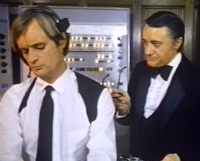
days. “Illya . . .” (Solo's “Be careful” is implied.) “I will if you will.” And Illya’s turn as the Cockney pilot is another gem.
More good stuff: the casting of Patrick Macnee as the Command's new commander (though he has little screen time), and a nod to the gone-but-not-forgotten Mr. Waverly.
Oddly, Vaughn looks younger and trimmer in the bush jacket than he does in tuxedo or dark suit. In the “old days,” as Kowalski puts it, it was the reverse. Speaking of Kowalski, Tom Mason does a good if thankless job showing us how the quality of Command agents has declined since Solo and Illya’s heyday.

The climax at the dam, with Solo slipping in past the usual comatose Thrush guards and the task force bearing down in speedboats, is exciting, with a visual sweep we rarely got in the original series. (Though I question that the Command force would be able to pick off the defenders so easily. There was a reason those medieval fortresses proved popular.) Illya’s faceoff with Janus below the reactor in Chicago works well too. Yes, we saw this time-running-out payoff many times in the Sixties and Seventies, especially on “Star Trek,” but director Ray Austin handles the cuts well.

Long-time fan and pro technical wizard
Bob Short -- who, thankfully, steered writer-producer Michael Sloan into giving the film what true U.N.C.L.E. flavor it often displays -- appears here, at 1:16:43, about to be slugged by Solo:
At the last, the quiet tag scene is a tribute to both actors and their characters.
One of the biggest complaints fans have about “Return” is that it reunites Solo and Illya, and then almost immediately sends them off in separate directions so they get little screen time together. However, as we’ve seen, this was a standard script ploy in the series, not always in poor episodes. Think of “Ultimate Computer,” “Nowhere,” “Four Steps,” “Prince of Darkness,” and “Master’s Touch.”
Verdict: Despite many old-style music cues and the whip-pan effect, despite some crafty lines, it’s not U.N.C.L.E. at its best. There are moments like the JB interlude that make us wince, and the slant is often more Bondian than it should be. And let’s be honest with ourselves. Vaughn and McCallum, though they’ve aged well, aren’t the youthful, dazzlingly good-looking guys we admired, and still do admire. This is disappointing, and may be at the core of why so many fans feel let down . . . but the script wisely acknowledges this and plays off it. Which, together with the humor, puts "Fifteen Years" head and shoulders above most "reunion" TV movies!
Memorable Lines:
Solo (at Caesar’s Palace, when his communicator suddenly sounds): “New battery . . . in my pacemaker.”

Solo (to New York cabbie): “Del Floria’s Tailor Shop, Second and Fortieth.”
Del Floria’s New Owner: “Your uncle used to live in the back of a tailor shop? Well, I guess apartments is pretty tough to find. Where do
you live -- the basement of the Pan Am Building?”
Solo (to Illya): “How about a hot dog?”
Illya: “Not up to your usual culinary standards, is it?”
Solo: “[Sepheran’s plan] will totally destroy our energy program.”
Illya: “How’s he going to do that?”
Solo: “Well, that’s for us to find out. For the sake of the world.”
Illya: “Don’t throw ‘the world’ at me. . . . How often did we save it?”
Solo: “Constantly, as I recall.”
Illya (having agreed to work for the Command again): “You must have been pretty sure of your persuasive rhetoric.”
Solo: “No, just your sense of morality.”
Illya (wryly): “Oh, that old thing.”
Illya (as they stroll through the corridor of the new HQ): “[The agents are a]ll men. What happened to the beautiful girls who used to work for U.N.C.L.E.?”
Solo: “They’re in the U.N.C.L.E. Home.”
Solo (trying to be funny as Z introduces the explosive bullets): “Well, if the elevator doors don’t open on time, I promise to contain myself.” (She eyes him, deadpan) “What happened to the special U.N.C.L.E. guns we used to carry?”
Z (without missing a beat): “They’re in the special U.N.C.L.E. wing of the Smithsonian.”
Illya (as the phone tech, loudly, to Kemp): “Who you think you are, waving a gun at me? This is New York! And here we wave guns at each other! We don’t need foreigners coming to do it!”
Illya (as the outraged tech): “I tell you both! From telephone company you will be hearing!”
Innocent Pennington-Smythe (as he and Illya dangle from a pipe): “You’ve been in this situation before.”
Illya: “Frequently.”
P-S.: “How’d you get out of it then?”
Illya: “I carried an explosive charge in my watch.”
P-S.: “Where do you carry it now?”
Illya: “In my shoe.”
P-S. (astonished): “What’d they change it for?”
Illya: “Progress.”
Solo: “This all seemed a lot easier fifteen years ago.”
Illya (with a weary chuckle): “It was.”
(By the way, the screen grabs here are mine, so any complaints about the quality should come to me and not to Lisa!)
 Welcome! If you've found this site through another, or via a search on "Man from U.N.C.L.E." or "Vaughn" or "McCallum," you've come to the right place.
Welcome! If you've found this site through another, or via a search on "Man from U.N.C.L.E." or "Vaughn" or "McCallum," you've come to the right place.











